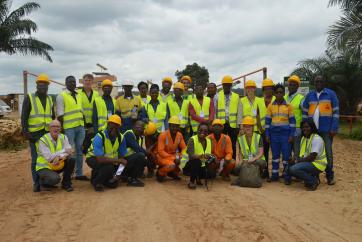Established in 1999 and a member of IUCN since 2018, Eco-Benin's mission is to promote human development at local and national levels through the development and enhancement of natural resources for ecotourism and eco-development. Eco-Benin initially collaborated with private companies through its innovative mangrove-planting programme for foreign travellers, especially from Europe, as an awareness and compensation tool for CO2 emissions from travel. This lead to certified compensation mechanisms in the voluntary market through the Clean Development Mechanism (CDM).
In 2013, Eco-Benin launched a carbon project based on the promotion of improved cooking woodstoves called Wanrou stoves. This was the first voluntary carbon project in Benin to be registered under the Gold Standard, generating carbon credits. Through a partnership with the Belgian company CO2logic, long-term partnerships were concluded with Belgian companies (Proximus and Interparking) for trading generated carbon credits and supporting the promotion of Wanrou stoves. At the end of 2019, three voluntary carbon projects based on Wanrou stoves were developed from the annual generation of 30.000 tons of CO2. The income generated makes it possible to finance the renewal and maintenance of actions on the ground.
Building on these achievements, Eco-Benin is firmly committed to involving Beninese businesses in climate and biodiversity conservation action. The Shared Resources, Joint Solutions (SRJS) programme in Benin, supported by IUCN and the Netherlands Committee of IUCN, allowed for significant progress to be made in this process. Following the training and coaching provided by the SRJS programme in 2017, Eco-Benin developed an action plan to involve Beninese businesses in the protection of global public goods. In fact, several large commercial companies are exploiting Benin's natural resources, such as water for mineral washing and electricity production, limestone quarries for cement production or gravel and sand for infrastructure construction.
The action plan has led to several dialogues, trainings and awareness activities with the private sector. This has included tours of companies’ facilities for the protection of global public goods, several corporate social responsibility (CSR) coffee sessions to showcase good CSR practices, joint conferences with businesses during fora (e.g. a side event at the African Carbon Forum), and contracts with companies for the implementation of biodiversity restoration actions. It has also led to the creation of a CSR working group, which includes NGOs, businesses and the public administration, which is currently leading the process of developing the Benin CSR Charter.
Benin, through its Ministry of Development and Planning, conducted a study on the perception and development of CSR. This study actually confirms Benin's commitment to involving companies in achieving the Sustainable Development Goals. Companies need to be aware of their dependence on natural resources and work towards reducing their impacts to make their activities more sustainable, with the help of NGOs.
About the author

Gautier AMOUSSOU, a Beninese national, is a trained forestry engineer. He is 43 years old and is particularly involved in projects relating to the protection and enhancement of biodiversity through community-based ecotourism.
For the past 15 years, he has been the coordinator of Benin Ecotourism Concern (Eco-Benin), a Beninese Non-Governmental Organization that promotes ecotourism and eco-development in Benin and West Africa.
Gautier Amoussou is the Africa Coordinator of the International Social Tourism Organization (ISTO) and is a founding member of the Responsible Tourism Network of Benin. For more details on the organization's achievements and activities, visit www.ecobenin.org .
Eco-Benin is a non-governmental organisation created in 1999. It promotes human development at local and national levels through the development and enhancement of natural resources for ecotourism and eco-development. It intervenes in the entire national territory through 250 villages.






